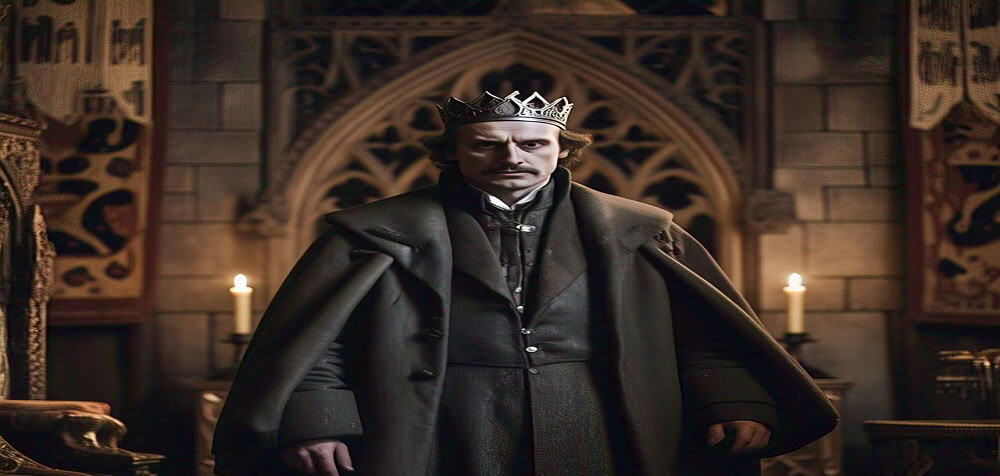

Hamlet as a Tragic Hero
Shakespeare’s Hamlet is one of the greatest examples of a tragic hero in literature. Following the Aristotelian model, Hamlet possesses noble birth, a tragic flaw (hamartia), internal conflict, and a downfall caused by his own actions. His procrastination, internal struggles, and feigned (or real) madness make him a complex and deeply human tragic figure.
Hamlet’s Noble Birth and Tragic Flaw
As the Prince of Denmark, Hamlet fits the classical definition of a tragic hero, being of high status. However, like all tragic heroes, he has a flaw (hamartia) that leads to his downfall—his indecisiveness and tendency to overthink. Instead of taking immediate revenge on Claudius, he delays, seeking absolute certainty before acting.
His hesitation is clear in his soliloquy:
“The spirit that I have seen / May be the devil; and the devil hath power / To assume a pleasing shape.” (Act 2, Scene 2)
Here, Hamlet doubts the ghost’s words, fearing it might be a trick. This overthinking prevents him from acting decisively.
Internal Conflict: Reason vs. Emotion
Hamlet’s tragic flaw leads to a deep internal struggle. He constantly debates whether to act or not, torn between his duty as a son and his fear of committing a sinful act. This conflict is famously expressed in his soliloquy:
“To be, or not to be, that is the question.” (Act 3, Scene 1)
This speech reflects his philosophical struggle with life and death, action and inaction. Instead of taking revenge immediately, he gets lost in thought, questioning the meaning of existence.
Procrastination: The Delay in Revenge
Unlike traditional revenge heroes, Hamlet does not act impulsively. Instead, he delays taking revenge on Claudius, waiting for the “perfect moment.” This leads to unnecessary suffering and unintended consequences, such as the deaths of Polonius, Ophelia, and eventually himself.
His reluctance is highlighted when he finds Claudius praying:
“Now might I do it pat, now he is praying; / And now I’ll do’t. And so he goes to heaven.” (Act 3, Scene 3)
Instead of killing Claudius immediately, Hamlet waits, hoping for a more damning moment—an act of over-analysis that leads to more chaos.
Madness: Real or Feigned?
Hamlet pretends to be mad as part of his plan to expose Claudius:
“To put an antic disposition on.” (Act 1, Scene 5)
However, his erratic behavior makes it unclear whether his madness is entirely an act or if he truly loses his grip on reality. His interactions with Ophelia, Gertrude, and Polonius suggest that his emotional distress might be genuine.
Ophelia, deeply affected by Hamlet’s actions, later descends into real madness and dies. This tragic consequence raises the question: Did Hamlet’s feigned madness contribute to real destruction?
Hamlet’s Downfall and Tragic End
Ultimately, Hamlet’s indecision leads to his downfall. His hesitation results in delayed revenge, the deaths of his loved ones, and his own demise. By the time he finally kills Claudius, it is too late—Hamlet himself has been poisoned and dies shortly after. His final words reflect his acceptance of fate:
“The rest is silence.” (Act 5, Scene 2) His journey from internal conflict to tragic resolution marks him as one of literature’s greatest tragic heroes.
Read More
Introduction to Hamlet and Shakespeare
Legacy and Themes of Doctor Faustus
Comic Relief & Subplots in Doctor Faustus
The Role of Mephistopheles and the Devil Pact in Dr Faustus
Introduction to Dr Faustus and Marlowe
Classical Theatre and Classical Drama
Plot Construction in Pride and Prejudice
Introduction to Fiction and Non Fiction
Of Death — Francis Bacon (Text)
Of Truth Critical Analysis by Sir Francis Bacon
Of Truth by Francis Bacon Summary
Visit Us on our Facebook Page:
A Detailed Synopsis of Doctor Faustus Below is a detailed synopsis of Doctor Faustus by…
Tradition of Revenge Tragedy in Hamlet Revenge tragedy was one of the most popular genres…
Introduction to Hamlet William Shakespeare is widely regarded as the greatest playwright in English literature,…
Igbo Language and Oral Traditions in Things Fall Apart Chinua Achebe’s Things Fall Apart is…
Tragic Flaw of Okonkwo: A Study in Aristotelian Tragedy In Things Fall Apart, Chinua Achebe…
Origin of English Drama: Mystery Plays, Morality Plays, Early Theatre The origin of English drama…
This website uses cookies.